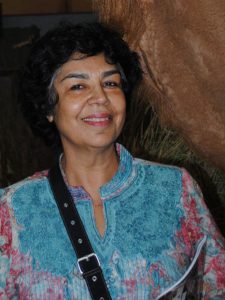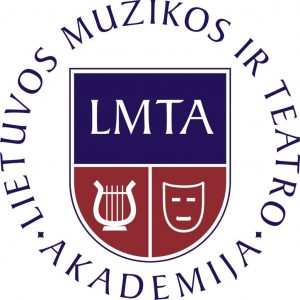Norteas Intensive course Forum in Vilnius
Norteas Intensive course Forum will held on 26th August – 2nd September 2018 in Vilnius at the Lithuanian Academy of Music and Theatre. The intensive course aims at bringing together the knowledge students have gained through the express courses and puts it into practice trough artistic projects. On the course student groups work independently towards a presentation under the supervision of a mentor. The Norteas member schools will propose mentors for the course. During the intensive week there will be series of talks in the afternoon with artists, intellectuals, cultural politicians and Nordic culture funds present their operation. [Download PROGRAMME]
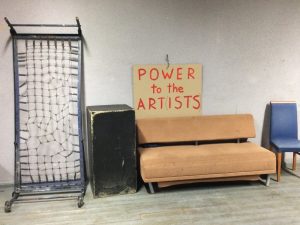 Norteas Intensive course Forum is curated by Karmenlara Ely, Artistic Director of Acting and Performance at Østfold University College/Norwegian Theatre Academy in Fredrikstad Norway:
Norteas Intensive course Forum is curated by Karmenlara Ely, Artistic Director of Acting and Performance at Østfold University College/Norwegian Theatre Academy in Fredrikstad Norway:
“Three speakers relating their practices and research uniquely to questions of sustainability, post-institutional art making contexts and to some extent, values and questions relevant to a critique of the anthropocene. All three speakers, in their varying approaches, put relations, materiality and interdependency at the center of their focus, critically different from individualistic, careerist art making approaches often found globally in academia and “the industry”. With the expanded fields of theatre and performance in reference, these internationally recognized artists offer strategies and perspectives which I believe inspire the next generation of artists to follow their instincts to remain critically tender and connected, relying on listening, collaboration, and even failure as key components to their practice.”
Schedule of keynote speeches:
26th August Una Chaudhuri
27th August Rebecca Hilton
28th August Edit Kaldor
————————————
Una Chaudhuri
“From Anthropocene to SymbioScenes: Staging Human Stories in a More-Than-Human Frame”
Description:
What roles can theatre and art play in the age of climate change? “Spreading the word” and “sounding the alarm” are valuable contributions. But didacticism has its limits, and theatre’s traditional investment in psychological and sociological complexities may now–in the age of climate chaos–need to expand. How might we include biological, even geological frames in the way we put human stories on stage?
Bio on Una Chaudhuri: Una Chaudhuri is Collegiate Professor and Professor of English, Drama, and Environmental Studies at New York University. She is the Director of NYU’s Center for Experimental Humanities and a pioneer in the fields of eco-theatre and Animal Studies. Her recent publications include: The Stage Lives of Animals: Zooësis and Performance, Animal Acts: Performing Species Today (co-edited with Holly Hughes, and The Ecocide Project: Research Theatre and Climate Change (co-authored with Shonni Enelow). Chaudhuri participates in collaborative creative projects, including the multi-platform intervention entitled Dear Climate, which has been presented in New York, Santa Barbara, Troy, Dublin, Abu Dhabi, Houston, and the Netherlands. She is a founding member of the theatre collective CLIMATE LENS.
————————————
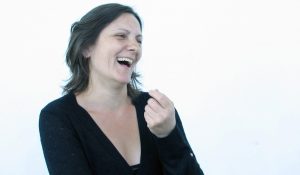 Rebecca Hilton
Rebecca Hilton
PARTICIPATE OR ELSE!?!?!?!?!?!?!?!?
3 anecdotes, 3 practices, 3 readings
ON
solidarity, singularity and sustainability
OR
community, plurality and subjectivity
OR
ethics, aesthetics and participation.
sustain
verb
1 they were concerned that the balcony might not be able to sustain the weight: bear, support, carry, stand, keep up, prop up, shore up, bolster, underpin, buttress. ANTONYMS collapse under.
2 she had lived life to the full, but now had only the memories of such times to sustain her: comfort, help, assist, encourage, succour, support, give strength to, be a source of strength to, be a tower of strength to, buoy up, carry, cheer up, hearten, see someone through; informal buck up. ANTONYMS torment, plague.
3 they were unable to sustain a coalition: continue, carry on, keep up, keep going, keep alive, keep in existence, keep, maintain, prolong, preserve, conserve, protract, perpetuate, bolster up, prop up, retain, extend.
4 she had a slab of bread and cheese to sustain her | Britain sustained a much lower population than did Italy: maintain, continue, preserve, keep, keep alive, keep going, provide for; nourish, feed, nurture, provide board for.
5 six Marines sustained slight injuries: undergo, experience, go through, suffer, endure.
6 the allegation was not sustained by any court: uphold, validate, ratify, vindicate, confirm, endorse, approve; verify, corroborate, substantiate, bear out, prove, authenticate, attest to, back up, evidence, justify.
-Oxford Thesaurus of English
Bio of Rebecca Hilton: Rebecca Hilton is an Australian dance person living in Stockholm. Her practices include performing, choreographing, directing, conversing and writing. Across three and a half decades in performance, She has contributed to the work of a range of artists including Russell Dumas, Stephen Petronio, Mathew Barney, Michael Clark, Tere O’Connor, Jennifer Monson, Tino Sehgal, Xavier Le Roy, Scarlet Yu, Chrysa Parkinson etc. At the Stockholm University of the Arts, as Professor in Choreography for the research area Site-Event-Encounter, she is developing GROUPNESS, a suite of projects researching relationships between embodied practices, oral traditions and choreographic systems. She works in contexts including workplaces, social groups, friendship circles and families. Currently she is an Artist in Residence at Malarbacken (Sweden’s largest elder care centre) as part of DoBra, a Karolinska Institute Research Project. DoBra is a decade-long, nation-wide research program exploring relationships to death and dying in Sweden.
———————————-
Edit Kaldor
“Creative Processes; Drive and Agency”
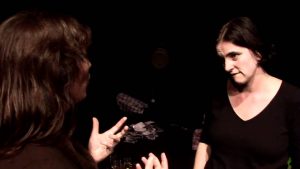 “In my talk I will zoom in on the intimate and complex process of making work. Based on my own practice and that of colleague artists, both contemporary and historical, I’d like to look at some of the forces that feed and maintain these processes. What is there behind the stubbornness, the determination to ‘Fail again. Fail better’? What is the drive, what is the agency? How do you recognize it? How do you sustain it? And how does it relate to the others: collaborators, spectators, and the broader community beyond the scope of the arts?”
“In my talk I will zoom in on the intimate and complex process of making work. Based on my own practice and that of colleague artists, both contemporary and historical, I’d like to look at some of the forces that feed and maintain these processes. What is there behind the stubbornness, the determination to ‘Fail again. Fail better’? What is the drive, what is the agency? How do you recognize it? How do you sustain it? And how does it relate to the others: collaborators, spectators, and the broader community beyond the scope of the arts?”
Bio of Edit Kaldor: Edit Kaldor is recognized internationally as a unique voice in the contemporary theatre landscape. She works with nonprofessional performers, mixing documentary and fictional elements, and often integrating the use of digital media. She lives in Amsterdam and works internationally. Her theatre performances, which stretch considerably the boundaries of theatrical conventions, have been presented in over 30 countries in Europe, the Americas, Asia and North Africa.
Kaldor was born in Budapest, and immigrated as a child to the United States, where she lived for ten years before moving back to Europe. She studied English Literature and Theatre at Columbia University in New York and at DasArts in Amsterdam. She had worked for years as dramaturge and video-maker with Peter Halasz (Squat theater/Love theater, New York), collaborating on numerous theatre performances and film scripts, before starting to write and direct her own pieces. She has taught and lectured at art academies across Europe, and has led numerous workshops in theatres, festivals and related contexts. Currently she is artistic research fellow at Østfold University College/Norwegian Theatre Academy in Fredrikstad, where she is developing her research project The Many and the Form: Working Methods for Participatory Co-Creative Practices in Postdramatic Theatre.
———————————————————–
The Sustainable Theatre Artist is a two-year pedagogical project that aims at artistic, professional and societal sustainability of future theatre and performing artists. The project is inspired by the challenge an artist must rise to – how to make meaningful art within the parameters of the professional field, the world around us and our planet and how to interact in an intelligent, resourceful and responsible way with our society in different cultural contexts.

